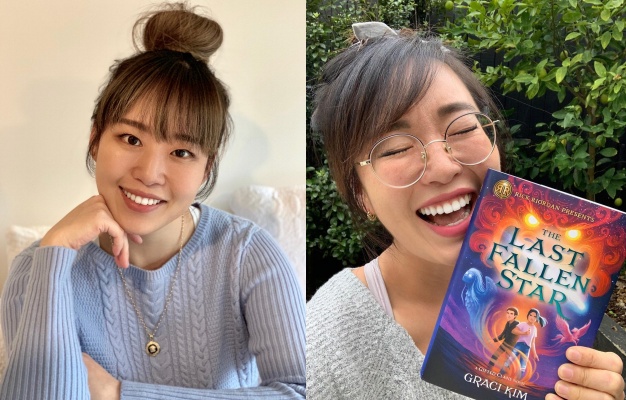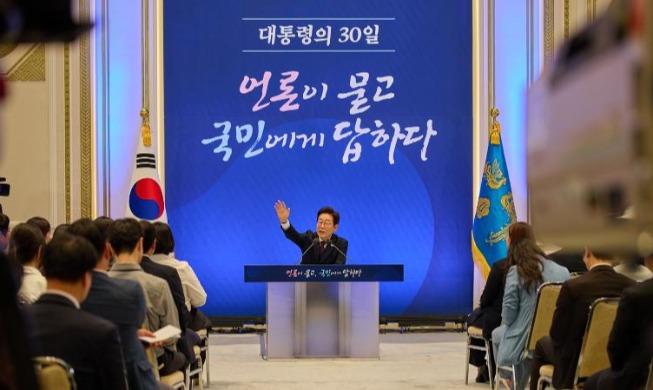- 한국어
- English
- 日本語
- 中文
- العربية
- Español
- Français
- Deutsch
- Pусский
- Tiếng Việt
- Indonesian
By Honorary Reporter Oshini Jayamuni from Sri Lanka
Photo = Graci Kim
The bestselling fantasy novel "The Last Fallen Star" is the first book of the "Gifted Clans" trilogy geared for middle school students by author Graci Kim, a onetime Korean New Zealand diplomat turned author.
The trilogy has earned accolades from Entertainment Weekly, Publishers Lunch and Goodreads, and the Disney Channel has optioned it for a live-action TV series. The magical tale incorporates Korean mythology while being set in the modern world, where Riley, a Korean adoptee in the U.S., discovers her heritage and ability to wield magic on a journey to save her family.
The following are excerpts from a Nov. 17 interview with the author.

"Gifted Clans" trilogy author Graci Kim lives in Auckland, New Zealand, with her husband and their daughter.
Please give a brief introduction of yourself.
I was born in Seoul, Korea, and my family immigrated to New Zealand when I was about 3. So I call myself a Ko-wi, or a Korean kiwi. I live in Auckland with my husband and our little girl. I was a diplomat for the New Zealand government for over a decade, but now, I'm a full-time writer and mother.
What motivated you to write the trilogy?
I read the book "Labyrinth Lost" by Zoraida Cordova, which is about diaspora Latinx witches living in the U.S. I love stories about witches and magic but I'd never heard of non-Caucasian witches. So when reading about these Latinx witches, my mind suddenly wondered about Korean witches, those of the Korean American diaspora in particular. And that started everything.
How was the writing process?
The published version "The Last Fallen Star" was the 17th draft of the book. It took a long time mostly because I was such a novice at the time. The book originally started as a young adult novel with characters age 15 going on 16 but later it got aged down to those age 12 going on 13. I made so many changes like removing romantic arcs in the first draft to focus more on the magic and heritage.
Where did your inspiration come from?
Part of it was a desire to put myself on a page. I grew up loving books as a child, but never saw myself in them.
When in elementary school, I said in a writing assignment about my family that they were blonde and blue eyed. My teacher asked me why I did that since my family is Korean, and I had no response. I got defensive and angry at her, saying, "It doesn't matter who you are in real life, because in books, everyone is white." So I am passionate about writing about people like me, who have my culture and speak my language. Not just Koreans, many people have a shared diaspora experience that I wanted to include in the book, about how sometimes we feel like we don't belong.
How did you craft the story, which mainly deals with themes like a sense of belonging and finding one's in the world?
It came from my upbringing in New Zealand. When I was in elementary school, there were few Korean or Asian kids in the neighborhood for the first few years. I got teased a lot and kids used to spit in my lunch, throw stones at me and tell me to go back to my country.
Yet when my family visited Korea, I felt like I didn't belong there but I had the same feeling around my friends in New Zealand. It made me think that being a Korean kiwi meant being neither Korean nor kiwi. As I grew up, I realized that my duality didn't mean I had to choose one or the other. So I wanted to explore many of these feelings and trying to fit in through my book. I truly believe that a sense of belonging starts within ourselves. We must first love and accept ourselves and only then will people accept us.
Part 2 of this interview to follow
enny0611@korea.kr
*This article is written by a Korea.net Honorary Reporter. Our group of Honorary Reporters are from all around the world, and they share with Korea.net their love and passion for all things Korean.
Most popular
- Grammy-winning producer calls Suga of BTS 'amazing artist'
- Animated 'KPop Demon Hunters' tops Netflix charts in 41 markets
- 'Squid Game' events to pump up K-Content Seoul Travel Week
- Reunited BLACKPINK releases video preview of world tour
- 'Universal love, family' themes fuel success of 'King of Kings': director
